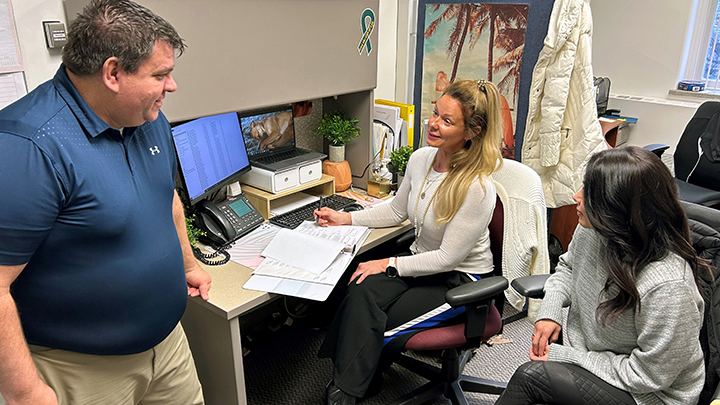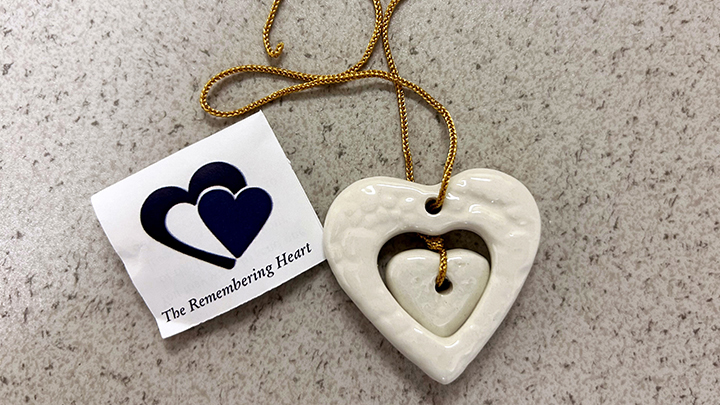
November 30, 2023

HOPE donor coordinators Scott Gordon, left, Marcey Kosman and Trudie Yeung discuss a patient case. Photo by Su-Ling Goh.

The gift of a HOPE ceramic heart serves as a treasured keepsake for the family of the donor. Photo by Su-Ling Goh.
Story & photos by Su-Ling Goh
Staff at Edmonton’s Human Organ Procurement and Exchange Program (HOPE) and Calgary’s Southern Alberta Organ and Tissue Donation Program have been busier than ever since the province’s Bill 205 took effect in April.
In one instance, organ donor coordinator Marcey Kosman meets with a weary-looking father on the worst day of his life. His daughter, a young adult, is on life support in the University of Alberta Hospital’s intensive care unit, with no hope for recovery. He tells Kosman his daughter would want to donate her organs and tissues, particularly her lungs, to help someone breathe. Kosman assures him there are many patients who would be grateful to receive his daughter’s life-saving gifts — and her team will do all they can to make that happen.
Kosman and her team have been speaking with families more often since the new legislation, which directs hospitals to refer all dying patients who could be eligible to donate organs or tissues. Also boosting referrals is the Specialist in End-of-Life Care, Neuroprognostication and Donation (SEND) program, which launched in 2021. Intensive care physicians work with healthcare teams to identify and care for potential donors.
As of the end of September of this year, 873 patients had been referred, compared to 665 during the same period in 2022 — a 31-per-cent increase year to year.
Donor coordinators are registered nurses with years of experience in intensive care. Their most important duty is supporting families whose deceased loved one likely qualifies for donation.
“I want to be sure that they understand I am simply there to offer an option and that everything I discuss is an option,” says Carey Beninger, one of Calgary’s 10 donor coordinators. “Our job is to help the families make the best decision for them in their absolute worst moment.”
“You need to be able to read people, but it’s always hard,” says Scott Gordon, one of Edmonton’s eight HOPE coordinators. “There’s a lot of emotion. You get attached to families quickly … you feel sympathetic. It’s a lot of emotional stress.”
After obtaining consent, coordinators ask families about the patient’s medical and social history, order medical tests, examine the patient, arrange operating room time and assist during organ retrieval. They also help place organs offered to and from other jurisdictions, and run education sessions.
Coordinators follow up with donor families for a year, sending them letters with updates on the condition of the people who received their loved one’s gifts. They also encourage recipients and donor families to write letters to each other (anonymously, unless both choose otherwise).
“Seeing someone grieve and being able to help them through the process is challenging but rewarding at the same time,” says HOPE coordinator Trudie Yeung.
Margaret Lidstone, former HOPE coordinator and current AHS Transplant Services’ Project Coordinator, stresses it’s important for families to discuss organ and tissue donation before the situation arises. “If your family knows what your wishes are, it’s easier (on them). Our goal is to get people to talk about it.”
Beninger adds: “It makes such a difference in such a stressful time. (Families) don’t want to get it wrong.”
Meanwhile, Kosman hands the father in the ICU a small ceramic heart. She explains that the inner section can be left with his daughter, while his family keeps the outer part. His face lights up, and he walks down the hall to place the heart with his daughter before he says goodbye.
One person’s organs can save up to eight lives, and there’s a constant shortage. Hundreds of Albertans are waiting for transplants. Register your wishes here: Alberta Organ and Tissue Donation Registry.